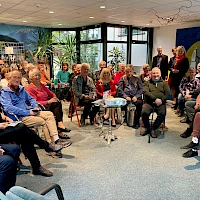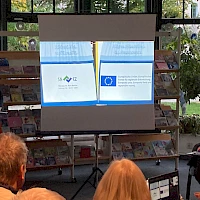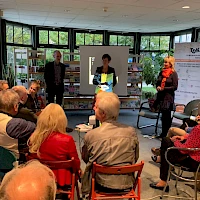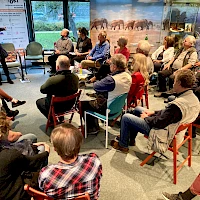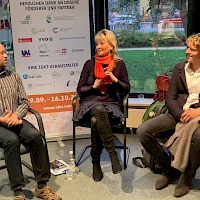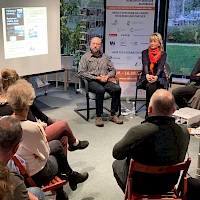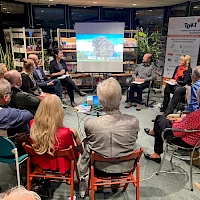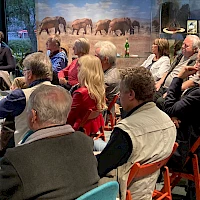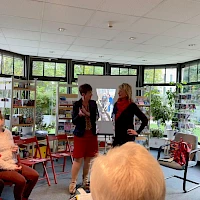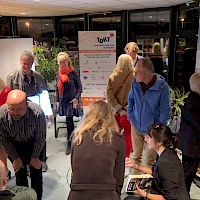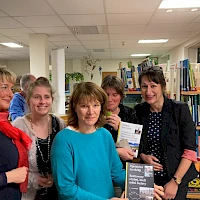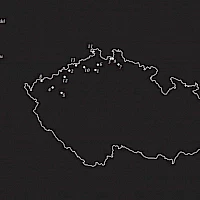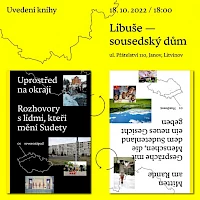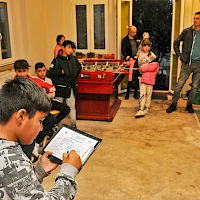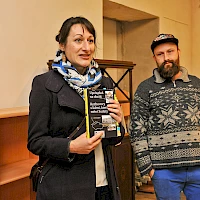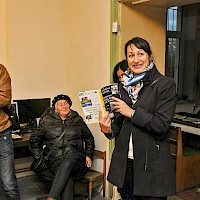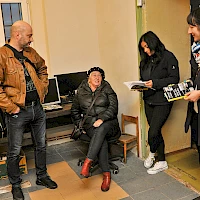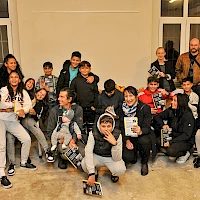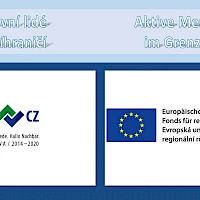Active people in the border region (2022)
The Czech border area with Saxony has had a negative reputation for decades, is often referred to as "no man's land" and is always seen as a problem region. It may seem so at first glance, but there are other sides too: many people are actively committed to improving living conditions and preserving historical evidence. Some of these active people shall be presented here. Their stories can serve as inspiration and show that civic engagement is worthwhile even in areas that seem to be left behind.
Interviews were conducted with them in 2021 and 2022, and some videos were also shot. The interviews were published in autumn 2022 in a brochure entitled "Mitten am Rande" in German and Czech. The brochure is available from the offices of the Euroregion Elbe/Labe and from Anticomplex.
Here we introduce you to the 13 people featured in the brochure.
The interviews (selection)
Jitka Pollakis
Mountain meadow maintenance in the Eastern Ore Mountains
A unique flora and fauna has developed over the centuries through the agricultural use of the areas in the Ore Mountains. This is threatened by the decline in agriculture. Jitka Pollakis has been organizing the HeuHoj camp in the Eastern Ore Mountains every summer for several years. Volunteers lend a hand, mowing meadows and making hay. But they also experience a supporting program that brings them closer to the border region and Saxon-Czech history.
Erich Vodňanský
young farmer from Stranné u Blíževedel
Erich Vodňanský's grandparents owned a farm in Stranné u Blíževedel, but were expropriated in the 1950s. They then left Czechoslovakia and moved to Vienna. Erich Vodňanský grew up there. After the Velvet Revolution, the grandparents got the farm back, but it was in a very bad state. They put a lot of time and money into rebuilding a thriving agriculture. Today Erich Vodňanský runs the farm. For him, the bond with the soil and the farm over generations is very important.
Alice Janstova
a lonely house in Jelení
The village of Jelení, located high in the Ore Mountains, consisted of a few houses until the end of World War II. Only one of them is left, which Alice Janstová lives with her Czech-Indian family. But it is by no means as lonely as it sounds, because people often pass by.
Petr Globočnik
socially engaged in Litvínov
In the eyes of many people, North Bohemia is a region battered by environmental pollution and social problems. Of course there are, but Petr Globočník doesn't accept it. He is involved in many social projects in the Janov prefabricated housing area in Litvínov.
Jarmila Ptackova
Tibetan flair in Velký Šenov
Probably nobody expects a yurt in the Šluknov tip, but there is one in Velký Šenov. It is a sign of Jarmila Ptáčková's bond with Mongolian culture, which she wants to convey to others in various ways.
About the project
The aim of the project was to present good examples of civil society engagement in the Czech border area in the form of a brochure. This should support the networking of the actors, spread inspiration and encourage personal commitment. The border area, known as the Sudetenland since the Middle Ages, had a negative reputation for years, was often referred to as "no man's land" and was always seen as a problem region. With this project, we wanted to question this narrative and use encouraging examples to show how positive change can be created.
It should also bring hope: for good German-Czech neighbors, reconciliation. For the Czech-German publication Mitten am Rande, interviews with people who are changing the Sudetenland , interviews were conducted with active people in the border region who are involved in various ways, cultivate good neighborly relations or reflect on the German-Czech past. Not only well-known actors were interviewed, but also new inspirational initiatives.
In the period from September 2021 to April 2022, 13 people from different parts of the border area who are members of clubs, associations, institutions or
also get involved privately for the region. When selecting the interview partners, care was taken to ensure that gender and social groups were appropriately taken into account.
The result of the project is an extensive bilingual brochure that is well suited for distribution at various events and other occasions. Short videos were created for some of the interviews and published on the Internet. They are particularly suitable for use in social media. The results of the project will be presented at separate events in Saxony and the Czech Republic.
In addition to the Elbe/Labe Euroregion, the Prague Anticomplex Association took part in the project.
![]() The project was funded under the number EEL-0840.02-CZ by the European Union via the small project fund in the Euroregion Elbe/Labe.
The project was funded under the number EEL-0840.02-CZ by the European Union via the small project fund in the Euroregion Elbe/Labe.

